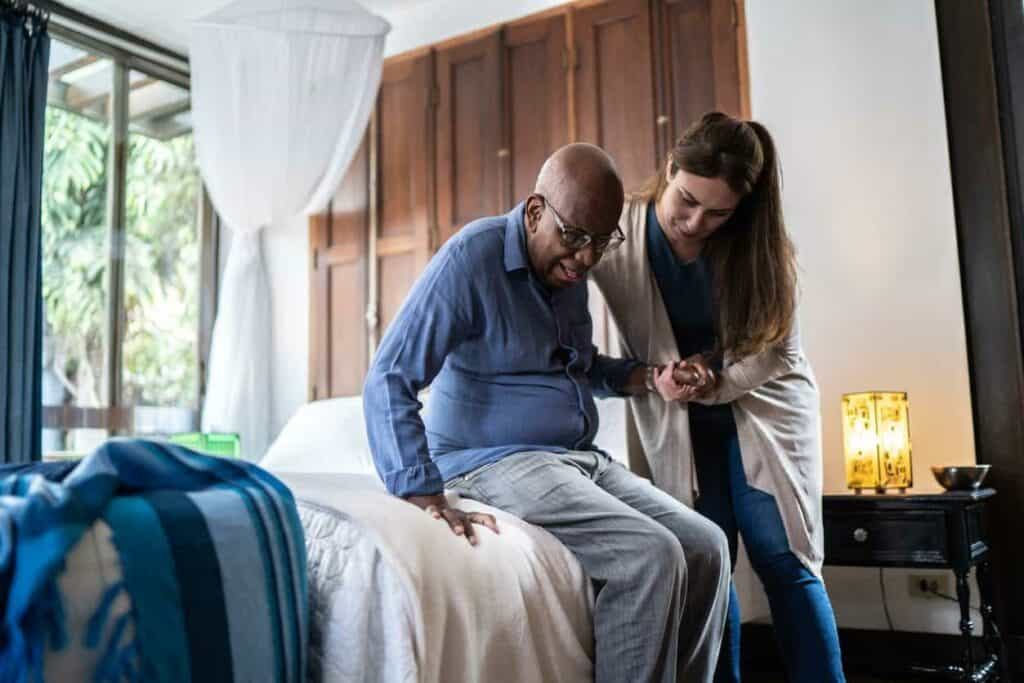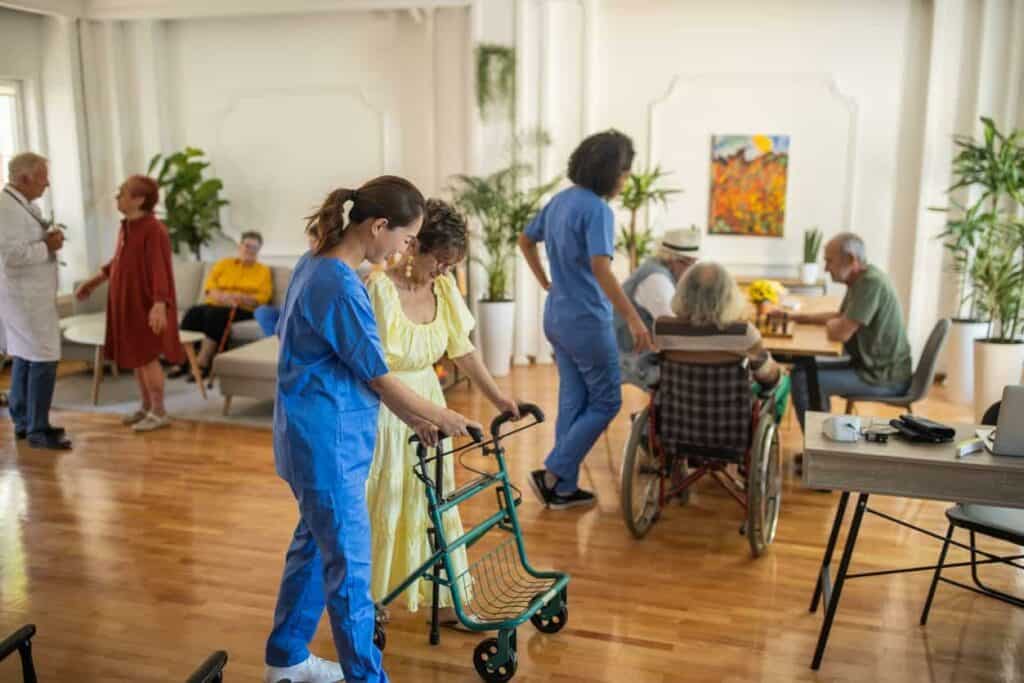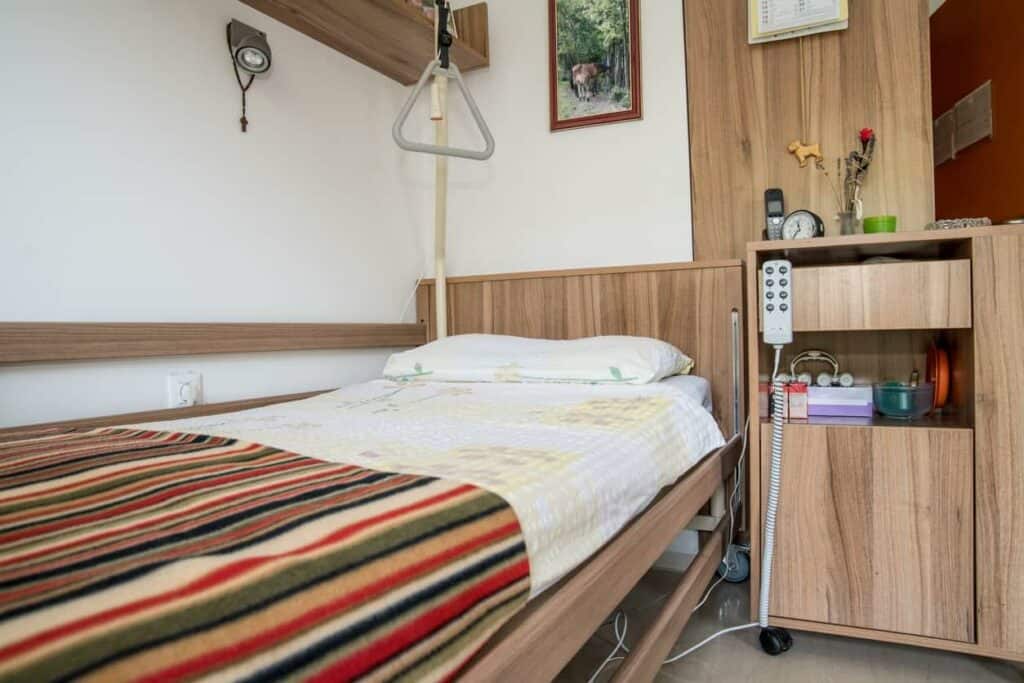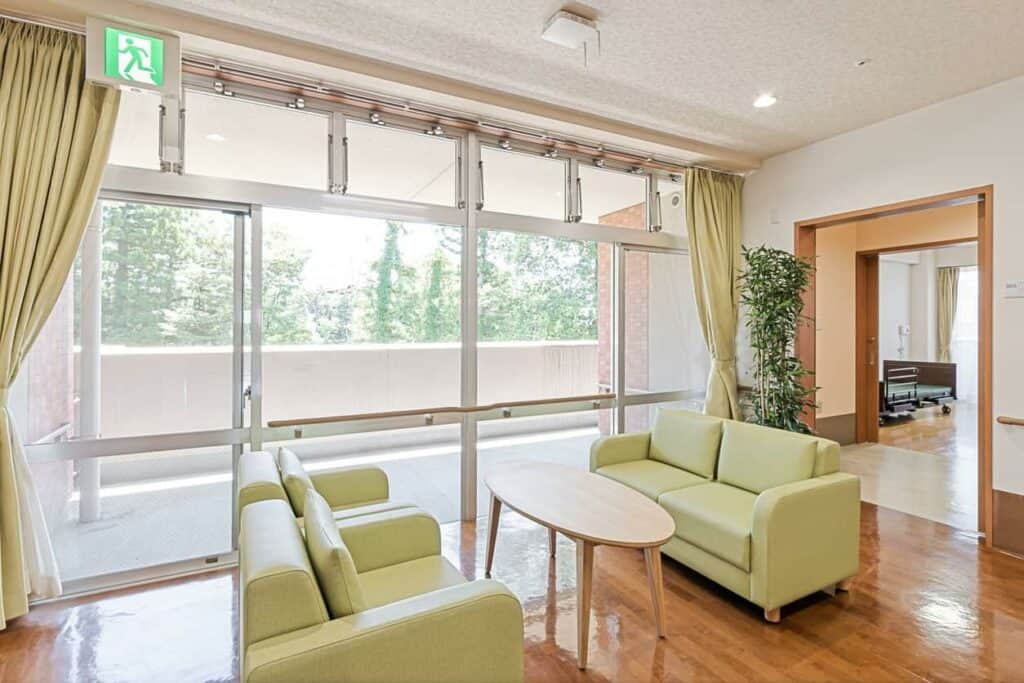Some of us live nomadic lifestyles, moving from place to place, never staying too long in one area. However, most people may move house only a few times in their lives – going to college, getting married, relocating for a tempting new position, and at retirement.
It is not uncommon for our aging loved ones to require moving to a new home when they need specialized care or assistance managing their health. As one study pointed out, over 20 percent of American seniors find one or more daily activities difficult to perform independently.
Every change in environment is associated with a lot of excitement and, not surprisingly, also stress. Starting somewhere anew can be thrilling and exhilarating, but it is also frustrating and scary. Even more so when you feel frail, with erratic health, or when it seems like you are about to lose your independence.
Therefore, we want to find the best possible senior living solution that will correspond to our loved ones’ needs and align with their preferences and budgets. The options in the charming Dayton are rich since the place has become a desirable destination for people looking to retire in a friendly environment surrounded by breathtaking natural landscapes.
Types of Senior Care Services
Senior care services are designed to meet the needs of older adults as they age. These services can vary in terms of the level of care, setting, and specific focus. Some different types of senior care available in Dayton Nevada are:
- In-home care services can be focused on general or medical care or a combination of both.
- In-home nursing care is performed by a skilled nurse and is often required after a hospital stay. The in-home nurse can provide wound care, medication management, physical therapy, and more.
- In-home assisted living includes professional caregiver’s assistance with activities of daily living (ADLs) like bathing, dressing, meal preparation, and companionship.
- In-home hospice care is similar to traditional hospice care but provided in the individual’s home. This allows seniors to remain in a familiar environment during their final stages of life.
- Assisted Living Facilities offer a mix of independence and assistance. Senior residents have their apartments or rooms, and receive help with daily tasks as needed while also having a chance to participate in various social activities.
- Nursing Homes are facilities that provide 24-hour skilled medical care and supervision for individuals with more complex medical needs.
- Memory Care is provided at specialized residential care facilities where individuals with Alzheimer’s disease, dementia, or other cognitive impairment conditions can receive care appropriate to their needs. These facilities offer secure environments and comprehensive support.
- Hospice Care or end-of-life care offers medical, emotional, and spiritual support for individuals with terminal illnesses and their families.
- Palliative Care is a type of comprehensive care for seniors with serious illnesses that focuses on relieving pain, managing symptoms, and improving the quality of life. It’s not limited to end-of-life care.
- Independent Living Communities are a housing solution designed for active seniors who can manage daily activities independently. These communities often provide social activities and hotel-like services and amenities.
- Continuing Care Retirement Communities (CCRCs) offer a range of living options on a single campus, from independent living homes to skilled nursing and memory care. Residents can transition between levels of care as needed.
- Senior Centers are community centers that offer a variety of services, activities, and resources for older adults, including fitness classes, social events, and educational programs. They may also offer the following types of care:
- Respite Care – Temporary care services that allow primary caregivers a break. Respite care can be provided at home or in a care facility.
- Adult Day Care – Centers that offer daytime supervision, socialization, and activities for seniors while their family caregivers are at work or need a break.
- Telehealth Services are remote healthcare services oriented towards seniors who have difficulty traveling. Telehealth allows seniors to consult with medical professionals via video calls.
- Transportation Services provide transportation to medical appointments, social outings, and other essential activities for seniors who may have difficulty driving.
These are just a few examples of the types of senior care services available. Your chosen service will depend on your or your loved one’s needs, preferences, and health status. An important step in the process is for families to assess the needs of their loved ones and explore the options that best align with those needs.
Home Care or Assisted Living Services, which one is better?
Both home care and assisted living services have their own sets of pros and cons. The choice between the two would depend entirely on the senior’s preferences, health conditions, and support needs. Below, we’ve compiled some positive and negative aspects of both options:

| Advantages of Home Care | DisAdvantages of Home Care |
|---|---|
Seniors can stay in the comfort of their own homes, surrounded by familiar surroundings and possessions. |
Seniors often experience feelings of isolation as they age because they don’t have regular social interactions. |
Home care can be tailored to the older adult’s specific needs and preferences, providing one-on-one attention. |
Opportunities for socialization and engagement may be limited compared to living in a community setting. |
Seniors continue to retain a higher level of independence and control over their daily routines. |
Finding and coordinating caregivers can be challenging at times, particularly if specialized care is required. |
Care schedules can be adjusted based on changing needs and preferences. |
Oftentimes, homes may need modifications to ensure safety and accessibility for seniors with mobility or cognitive issues. |
Family members can easily participate in caregiving and provide emotional support. |
Family caregivers, who are most often home care providers, can experience burnout due to the demands of delivering round-the-clock care. |
Home care can sometimes be more cost-effective than assisted living options. |
In some cases, it may be difficult to ensure that the quality of care provided at home meets all medical and safety needs unless a professional in-home caregiver is involved. |

| Advantages of Assisted Living | Disadvantages of Assisted Living |
|---|---|
Assisted living communities offer built-in social opportunities, successfully preventing isolation. |
Seniors may be expected to give away much of the control they used to have over their daily routines and living environment compared to being at home. |
These communities typically provide a structured daily routine, benefiting seniors who thrive on routine. |
Adjusting to a new living environment is often emotionally challenging for some seniors. |
Trained personnel are available 24/7 to provide assistance with daily activities, therapies, and medical needs. |
Assisted living facilities can be an expensive venture, especially as there are additional costs that correspond to the level of care required. |
Assisted living facilities are designed and decorated with residents’ safety in mind, including features like handrails, shower safety equipment, and emergency call systems. |
Care and activities at an assisted living center are more structured, and tailoring them to individual preferences may be difficult. |
Many assisted living communities offer conveniences such as dining services, fitness centers, occupational therapy sessions, daily trips, entertainment, and other planned activities. |
Living in close proximity to other residents may lead to concerns about privacy and prove tough to adjust to for some older adults. |
Assisted living can ease family members’ burden of caring full-time for their aging loved ones, allowing them to focus on their own lives. |
The rotation of staff in assisted living could result in less consistent and less personalized care. |
Ultimately, the decision between home care and assisted living in Dayton should be based on a thorough assessment of your beloved senior’s physical and emotional needs, financial situation, and personal preferences. It is helpful to involve them in the decision-making process, if possible, to ensure their wishes are respected.
What More Can a High-Quality Senior Living Facility Offer?
Standing out from the rest of the assisted living facilities are the luxury senior living services such as Amy’s Eden. They offer numerous additional benefits to older adults, enhancing their overall well-being and quality of life. Here are five ways in which luxury living facilities add extra comfort and care for their residents:
Comprehensive Care and Support
High-quality senior living services provide extensive care and bespoke support to each of their residents. This is due to the higher staff-to-seniors ratio, ensuring that every person living on the premises is cared for at all times. Additionally, the personnel are professionally trained, certified, and experienced in dealing competently and empathically with all kinds of emergency situations.
Socialization and Engagement
High-end senior living communities offer a rich social environment with opportunities for interaction and engagement. Residents can participate in a variety of activities, events, and outings, fostering friendships and a sense of belonging. Social interactions contribute to mental stimulation, emotional well-being, and the prevention of isolation, which can be particularly beneficial for seniors’ mental health.

Convenience and Amenities
Offering a range of amenities that simplify and enrich seniors’ daily lives is another feature that sets luxurious facilities apart from the rest. These can include top-tier fine-dining services, housekeeping, luxury transportation, fitness centers, and recreational facilities. Having these amenities readily available can contribute to a more comfortable and enjoyable lifestyle, allowing seniors to focus on activities they love.
Serene Atmosphere and Sumptuous Interior
Upscale living facilities are usually located in desirable parts of the city. They are surrounded by captivating natural landscapes in esthetically pleasing buildings furnished with elegant design pieces. Common areas often resemble lobbies of deluxe hotels that help bring up feelings of relaxation and tranquility.
Holistic Wellness Programs
These often focus on various aspects of well-being, including physical fitness, cognitive stimulation, emotional support, and spiritual activities. Holistic wellness programs promote a balanced and fulfilling lifestyle, helping seniors maintain their independence and overall health.

Naturally, the benefits of high-quality senior living services can vary depending on the specific caregiver and the level of care provided. If you are considering senior living options, it’s best to visit a number of different facilities, ask questions, and gather as much information as possible to ensure that the chosen service aligns with the needs and preferences of your loved one.
How to Choose the Right Senior Living Facility
Moving to a senior living community in Dayton is a consequential decision that requires careful consideration. Often, families and older adults have many questions concerning the facility, the service, financial factors, independence, etc.
Ten factors to consider when selecting a senior living facility
Location
A conveniently located facility for family members and friends to visit is always better. Consider the climate and its proximity to hospitals, clinics, shopping centers, and cultural amenities.
Level of Care
Learn about the level of care the community offers. Are there independent living, assisted living, memory care, or skilled nursing care? Confirm that the community can meet your beloved’s current and potential future needs.

Services and Amenities
Evaluate the services and amenities offered, including dining options, housekeeping, transportation, fitness facilities, social activities, and wellness programs. Ensure that all or some of these amenities align with your loved one’s interests and hobbies.
Staff Qualifications
Inquire about the qualifications and training of the staff members. Entrusting your aging loved one in the hands of skilled, experienced, and compassionate caregivers will give you the maximum peace of mind.
Healthcare Services
If you are looking into a facility providing healthcare services, assess the availability of on-site medical care, medication management protocols, and access to healthcare professionals. Check their plans of action in emergency situations.
Safety and Security
Safety features include well-maintained buildings, secure entrances, emergency response systems, and trained staff available around the clock. While indoors, you should check for handrails, bathroom seats, and door locks with emergency release systems.

Social and Recreational Activities
A robust calendar of social and recreational activities promotes social engagement and facilitates relationships. Attending events or activities during a visit might be a good idea to see if your beloved will feel intrigued and comfortable.
Community Atmosphere
The overall atmosphere of the community is important, too. Is it warm, welcoming, and inclusive? Pay attention to the manner of interactions between staff and residents.
Cleanliness and Maintenance
The cleanliness and maintenance of the facility reflect the management’s commitment to providing a comfortable living environment. If there is sloppiness in this regard, you may be sure that they will also be sloppy in caring for your beloved.

Resident Feedback
Take time to read the online reviews and speak with current residents and their families to gain insights into their experiences. Their perspectives can provide valuable information.
After going through the above list, here are some practical suggestions you may wish to follow during the process of making a decision about one or more particular facilities.
Tips to Help You Select the Best Senior Living Facility
- Visit Multiple Communities to compare surroundings, services, amenities, and atmospheres. This will help you make an informed decision.
- Ask Questions. Prepare a list of questions to ask during your visits. Inquire about fees, staff training, level of care, services, and any specific concerns you may have.
- Involve the Senior. If possible, involve your loved one in the decision-making process. Their wishes, preferences, and comfort are essential.
- Visit at Different Times: Schedule visits at different times of the day to observe the community’s atmosphere and activities during various hours.
- Understand What You Are Paying For. What comprises the cost structure, including monthly fees and any additional charges? Make sure the chosen community is within your budget.
- Review the Contract. Carefully read the contract and familiarize yourself with the terms, policies, and potential exit strategies. Don’t hesitate to seek legal advice if needed.
- Plan for the Future. Consider the potential progression of your beloved’s health needs and whether the community can accommodate changing care requirements.

- Trust Your Instincts. Pay attention to your gut feelings during visits. A comfortable and positive feeling about a community can be a good indicator.
- Seek Recommendations. Ask friends, family, healthcare professionals, or social workers for recommendations based on their experiences.
- Check online’s reviews and testimonials. Even when taken with a grain of salt, these comments can provide insight into how other residents and their families felt about the facility you are interested in.
- Take Your Time. Don’t rush the decision. Take the time to gather all the information you need, ask all questions you have in mind, and make a well-informed choice.
Choosing a senior living facility involves thoughtful planning and research. By considering these factors and following these tips, you can make a decision that best suits the needs and preferences of your aging loved one.
We at Amy’s Eden are ready to answer all of your questions regarding our assisted living homes and home care services in Dayton, Reno, and nearby areas. Contact us to schedule a tour or an assessment home visit with our specialists.





